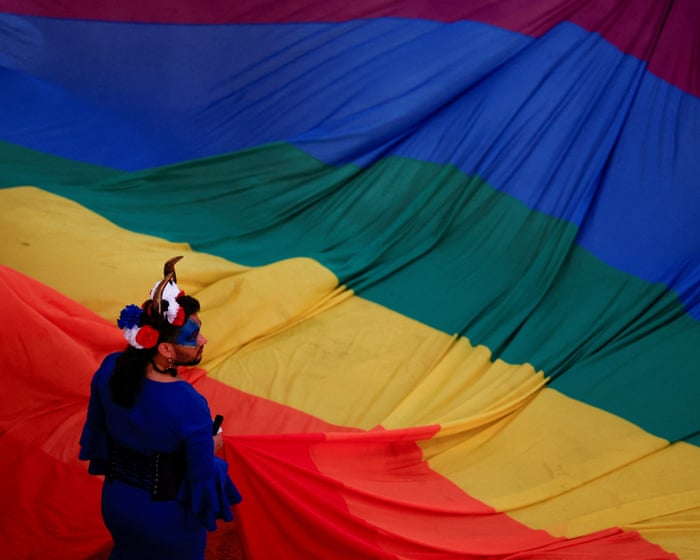According to the EU’s leading rights agency, Europeans who do not identify as strictly male or female are facing a sharp and concerning increase in violence. This rise is linked to organized disinformation campaigns that aim to spread hatred against them.
The findings, released on Tuesday by the EU Agency for Fundamental Rights, are based on responses from 1,920 people across 30 European countries. All participants identified as intersex—a broad term that includes individuals with innate variations in sex characteristics, as well as those who identify as trans, non-binary, or gender diverse.
The report shows that since 2019, violence and harassment against intersex people have risen sharply, especially among trans, non-binary, and gender diverse individuals. This increase far exceeds that experienced by other groups within the LGBTQ+ community.
Thirty-four percent of those surveyed reported being physically or sexually assaulted in the five years leading up to the survey, up from 22% in 2019. Hate-motivated harassment nearly doubled during the same period, rising from 42% to 74%.
Additionally, 57% of respondents said they had undergone surgery or medical treatment to alter their sex characteristics without their informed consent. Another 39% reported being subjected to so-called conversion practices aimed at changing their sexual orientation or gender identity—a rate higher than the 25% reported across all LGBTQ+ groups.
The Vienna-based agency attributed this rise in hostility to a broader climate of growing intolerance and bigotry, intensified by online hate campaigns that target the LGBTQ+ community. It noted that both foreign and domestic actors are using disinformation to undermine European values like dignity, equality, and diversity.
These campaigns take advantage of the general public’s lack of familiarity with intersex, trans, non-binary, and gender diverse people, spreading false information to incite hatred and violence.
The report aligns with warnings from organizations across Europe about politicians using public platforms to fuel anti-LGBTQ+ sentiment and normalize discrimination.
The agency emphasized that the consequences of this discrimination are severe, often leading to social exclusion, homelessness, and mental health crises. More than half (53%) of intersex respondents had considered suicide in the past year—a significantly higher rate than the 37% reported across all LGBTIQ groups.
The EU agency urged countries to include sex characteristics as a protected category in anti-discrimination laws and to take stronger action against hate crimes and speech targeting intersex people.
Sirpa Rautio, the agency’s director, stressed that their situation demands an urgent response.The director of the EU’s Agency for Fundamental Rights stated, “Intersex people in the EU face alarming levels of exclusion, discrimination, and violence.” She emphasized, “They must receive targeted support that meets their specific needs to ensure they can fully enjoy their fundamental rights and live with dignity.”
Frequently Asked Questions
Of course Here is a list of FAQs about the recent EU report on violence against intersex individuals designed to be clear and accessible
BeginnerLevel Questions
1 What does intersex mean
Intersex is an umbrella term for people born with natural variations in their sex characteristics that dont fit typical binary definitions of male or female bodies
2 What did the EU report find
The report found a significant and concerning rise in violence and discrimination against intersex people across European Union countries including physical attacks hate speech and harmful medical practices
3 What kind of violence are we talking about
It includes verbal harassment and hate speech physical assaults bullying discrimination in healthcare employment and education as well as nonconsensual and unnecessary medical interventions on intersex children
4 Why is this happening
A major cause is widespread lack of awareness and understanding about intersex variations Deeprooted social stigma rigid gender norms and outdated medical practices that aim to normalize bodies contribute to this violence
5 Are these medical procedures on children really a form of violence
Yes when they are performed on infants and children who are too young to consent These irreversible surgeries are often done for cosmetic or social reasons not medical necessity and can cause lifelong physical and psychological harm
Advanced Practical Questions
6 Beyond physical violence what other forms of discrimination does the report highlight
The report details systemic discrimination including difficulties obtaining official documents that reflect their identity barriers to accessing appropriate healthcare and a lack of legal protection from discrimination in many member states
7 What are nonconsensual medical interventions and why are they problematic
These are surgeries and hormonal treatments performed on intersex infants and children to make their bodies appear more typically male or female They are problematic because they violate bodily autonomy are often irreversible and are based on social bias rather than urgent health needs
8 What is being done to address this
The EU report calls for member states to ban nonconsensual medical interventions on intersex children strengthen antidiscrimination laws improve training for healthcare and legal professionals and fund public awareness campaigns
9 How can I be an ally to the intersex community



